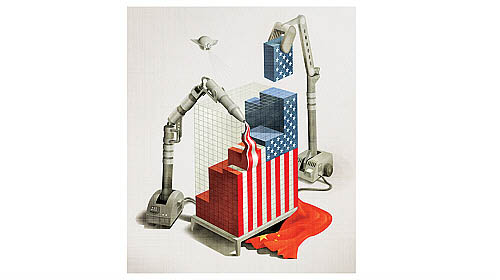An Eyes Wide Open Look at U.S. Manufacturing
Co-author, ‘Death by China’
Senior Economist, American Jobs Alliance
December 31, 2012
As the quote above illustrates, her arguments fly in the face of the current U.S. business school paradigm which seems to be: Leverage America’s R&D and capital to create great consumer products, manufactured abroad — usually China — in order to maximize shareholder return. In this mindset capital is not king, but God, bearing no allegiance to any nation, community, firm or employee. As academics, we teach our business leaders: The fate of individuals is not your concern — unless they are CEOs or stockholders — as competing with third-world wages and standards will actually do them good. In this curriculum the only thing that matters is getting the biggest number on the left side of the equation next quarter, even if the ironic long-term consequences of this short term thinking may be the subjugation of the capitalist system that created it to a foreign and avowedly communist regime.
Let me be clear that Can American Manufacturing Be Saved? is no emotional, xenophobic rant against trade. Nash-Hoff views trade as a tough playing field that Americans used to rule and can win on again. The book starts with a gritty history of U.S. manufacturing and its associated politics. It accepts no sacred cows as it turns over all the rocks and exposes the good, bad and ugly in four centuries of American industry, unions, and politicians. The author happily skewers the intransigent labor leaders, complicit managers, and naïve politicians of the last century who guided American manufacturing into a period of ludicrous union contracts and built our Kafkaesque regulatory environment.
That said, Nash-Hoff is quick to remind cynics that just because the pendulum may have swung too far, it doesn’t mean that we want to be living in the 19th century again either:
“It is important for Americans to remember that unions can be credited with the end of child labor, improved worker safety, increased wages for both union and non-union workers, reduction in the work day from more than 10 hours to eight, and the raising of our entire society’s standard of living. In essence, unions raised the lower class of workers up into the middle class.”
“Jobs paying the $20 per hour that historically enabled American wage earners to support a middle-class standard of living are leaving the U.S. Only 16 percent of today’s workers earn the $20 per hour baseline wage, down 60 percent since 1979.”
“Manufacturing is the foundation of the U.S. economy and our country’s large middle class. Losing the critical mass of our manufacturing base would result in larger state and federal budget deficits and a decline in U.S. living standards. This, in turn, would result in the loss of the large portion of our middle class, which depends on manufacturing jobs. America’s national defense would be in danger and it would be impossible to maintain the country’s position as a superpower.”
“Well, Americans now need to get as “mad as hell” about bad trade laws, bad tax laws, and over-burdensome regulations on manufacturers. It’s time to become engaged in a grassroots fight to change the bad free-trade laws into better fair-trade laws that will reflect the interests of small manufacturers who’ve been absent from trade policy deliberations for far too long.”
“A manufacturer can apply all of the recommendations in this chapter and still fail because of circumstances and outside factors beyond its control. Very few American manufacturers can survive when their industry has been targeted by China for product dumping.”




Other than the part about checking our ideologies at the door, this was an excellent and helpful synopsis of the book. If ideology = the way we perceive reality and how it *should* be, then it is inescapable. If we take ideology to mean something to the effect of “a narrow set of propositions that are not subject to scrutiny”, then I would agree that ideology stands in the way of accomplishing truly great things.
Do you really think the government can solve this issue? Given their ineptitude and corruption in so many other areas, what would cause them to suddenly wake up, smarten up, and man up? The comment Matt makes is astute. It also mirrors the problem in Washington. The folks there are so far removed from reality that they can’t make the distinction made by Matt.
The media doesn’t help because the trash they present as news is laughable. So is the slant. The news knows how to tell a story and still miss the point. Certainly if they do get the facts right they tend to miss direct the implication.
Yes this might sound cynical. I wish it was. I would prefer that I was cynical rather than being a realist.